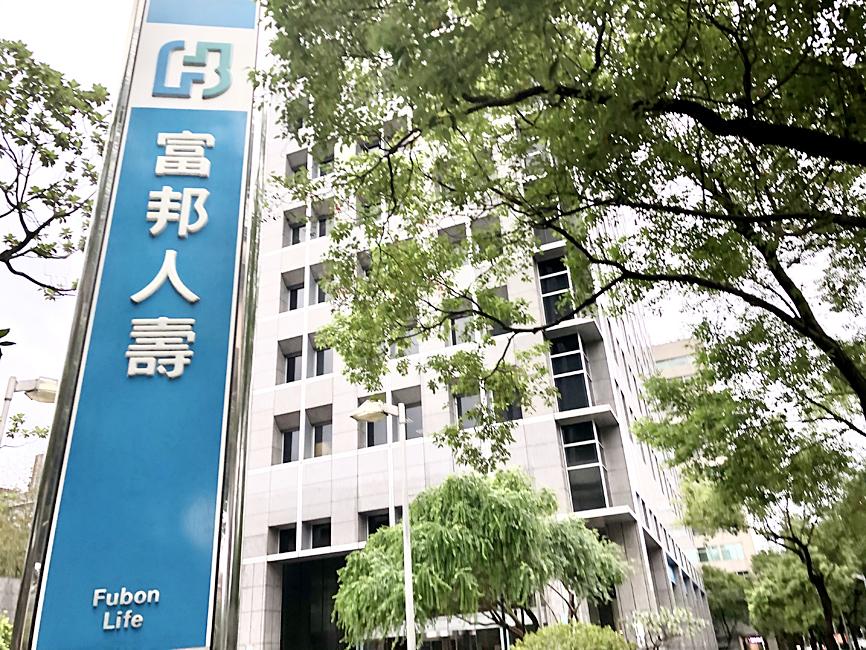Fubon Life Insurance Co (富邦人壽) yesterday reported that its first-year premiums (FYPs) for the first three quarters fell 44.6 percent year-on-year to NT$93.1 billion due to stricter regulations and the COVID-19 pandemic.
The FYPs are received in the first year of a recurring policy and are the main resource for life insures’ new investments.
Fubon Life in May forecast that its FYPs would fall 30 percent for the whole of this year.

Photo: Kelson Wang, Taipei Times
The life insurer yesterday said that the pandemic has slowed down its marketing activities, resulting in the larger-than-expected plunge in FYPs.
As the Financial Supervisory Commission implemented new rules that prevent life insurers from focusing on savings-type policies, Fubon Life was also forced to shift its marketing focus to investment-linked policies, health insurance products and accident-related insurance policies, Fubon Life executive vice president Chao Tsai-Ling (董采苓) told an investors’ conference in Taipei.
“We now predict an annual retreat of 40 percent in our FYPs for the whole of this year, but we expect to regain momentum next year with a high single-digit percentage increase,” Chao said.
Despite the falling FYPs, Fubon Life saw its return on investment before hedging and return on investment after hedging rise to 5.13 percent and 4.51 percent respectively last quarter, up from 4.86 percent and 4.2 percent a quarter earlier.
The trend could be attributed to the company receiving more cash dividends from its stock investments, and more capital gains from its investments in fixed income securities and stocks, Chao said.
Fubon Life’s hedging costs fell to 96 basis points, down from 102 basis points a quarter earlier, Chao said, adding that its hedging costs were lower than those of other life insurers as the firm uses forward contracts to hedge most of its assets, which are a more effective tool than proxy hedges or non-deliverable forwards.
Fubon Life would continue to focus on investing in long-term US dollar-denominated corporate bonds, and would further raise its investment in domestic and foreign stocks, but would make sure that its portfolio is diversified, she said,
Meanwhile, Taipei Fubon Commercial Bank (台北富邦銀行), the banking arm of Fubon Financial Holding Co (富邦金控), reported a d of 3 percent in its net fee income for the first three quarters due to declining wealth management business and slowing syndicated loans, general manager Roman Cheng (程耀輝) said.
The bank would concentrate on providing personal loans, and loans to small and medium-sized companies as they have higher margins, Cheng said.
The combined profits at its overseas branches fell 24 percent to NT$3.31 billion for the first three quarters as its Hong Kong branch was affected by interest rate cuts and the territory’s political tensions, while its branch in Singapore set more loan provisions due to bad loans, Cheng said.
Fubon Financial is forecasting that the local economy would rally 3.5 percent to 4 percent next year, depending on COVID-19 vaccine development, chief economist Lo Wei (羅瑋) said.

TECH BOOST: New TSMC wafer fabs in Arizona are to dramatically improve US advanced chip production, a report by market research firm TrendForce said With Taiwan Semiconductor Manufacturing Co (TSMC, 台積電) pouring large funds into Arizona, the US is expected to see an improvement in its status to become the second-largest maker of advanced semiconductors in 2027, Taipei-based market researcher TrendForce Corp (集邦科技) said in a report last week. TrendForce estimates the US would account for a 21 percent share in the global advanced integrated circuit (IC) production market by 2027, sharply up from the current 9 percent, as TSMC is investing US$65 billion to build three wafer fabs in Arizona, the report said. TrendForce defined the advanced chipmaking processes as the 7-nanometer process or more

China’s Huawei Technologies Co (華為) plans to start mass-producing its most advanced artificial intelligence (AI) chip in the first quarter of next year, even as it struggles to make enough chips due to US restrictions, two people familiar with the matter said. The telecoms conglomerate has sent samples of the Ascend 910C — its newest chip, meant to rival those made by US chipmaker Nvidia Corp — to some technology firms and started taking orders, the sources told Reuters. The 910C is being made by top Chinese contract chipmaker Semiconductor Manufacturing International Corp (SMIC, 中芯) on its N+2 process, but a lack

NVIDIA PLATFORM: Hon Hai’s Mexican facility is to begin production early next year and a Taiwan site is to enter production next month, Nvidia wrote on its blog Hon Hai Precision Industry Co (鴻海精密), the world’s biggest electronics manufacturer, yesterday said it is expanding production capacity of artificial intelligence (AI) servers based on Nvidia Corp’s Blackwell chips in Taiwan, the US and Mexico to cope with rising demand. Hon Hai’s new AI-enabled factories are to use Nvidia’s Omnivores platform to create 3D digital twins to plan and simulate automated production lines at a factory in Hsinchu, the company said in a statement. Nvidia’s Omnivores platform is for developing industrial AI simulation applications and helps bring facilities online faster. Hon Hai’s Mexican facility is to begin production early next year and the

Who would not want a social media audience that grows without new content? During the three years she paused production of her short do-it-yourself (DIY) farmer’s lifestyle videos, Chinese vlogger Li Ziqi (李子柒), 34, has seen her YouTube subscribers increase to 20.2 million from about 14 million. While YouTube is banned in China, her fan base there — although not the size of YouTube’s MrBeast, who has 330 million subscribers — is close to 100 million across the country’s social media platforms Douyin (抖音), Sina Weibo (新浪微博) and Xiaohongshu (小紅書). When Li finally released new videos last week — ending what has